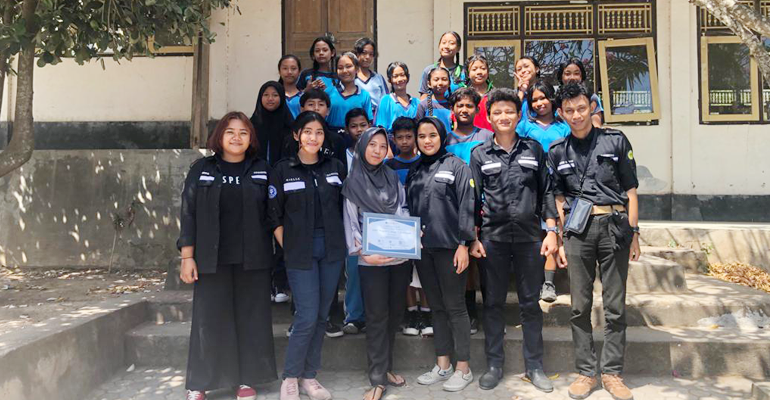ITK IPB University Students’ Educational Action, Exposing the Dangers of Microplastics to Marine Ecosystems

Students from the Department of Marine Science and Technology (ITK), Faculty of Fisheries and Marine Science (FPIK) IPB University carried out an educational action and outreach to microplastics at the Public Junior High School (SMPN) Satu Atap 1 Gerokgak, Buleleng, Bali. This activity is part of a series of Himiteka VIII Expeditions as an effort to increase public awareness, especially the younger generation, about the importance of keeping the sea clean and preserved.
In the educational session, students conveyed information about the origin of microplastics, types of microplastics, their negative impact on marine ecosystems and campaign actions to reduce plastic use. This presentation is packaged in an interesting way through a story entitled ‘Miko the Microplastic’ which was initiated by Asa Conservation so that it can be better understood and improve the classroom atmosphere.
Apart from that, the students of SMPN Satu Atap 1 Gerokgak were also given experience to recognize the types of microplastics directly using a digital microscope. Armed with microplastic samples and a digital USB microscope, the students were invited to be able to directly observe microplastic samples which are often found in the sea.
“Education about microplastics is very important because it is a problem throughout Indonesia’s coastal and marine areas. Through this microplastic education, we hope it can be of benefit to the students of Junior High School Satu Atap 1 Gerokgak so that they are more aware of one of the problems that occur in our seas,” said Mirandika Idris, Chairman of the Marine Science and Technology Student Association (Himiteka) IPB University.
The last session of the educational activity was carried out by working on a module given to students to test junior high school students’ knowledge of microplastic waste. Module work is carried out in groups, where one group is given one module to work on together. Students were also invited to play an active role in this activity by singing and playing riddles. Students also give prizes to students who are active and correct in answering questions.
The students were very enthusiastic and enthusiastic in listening to the presentations from the students. Martha, one of the teachers at SMPN Satu Atap 1 Gerokgak, hopes that this activity can encourage behavior change in dealing with environmental challenges, especially the problem of microplastics.
“We are very grateful to you for the education that has been delivered to our students. With the right education, such as microplastic education, the younger generation will become great future agents of change in supporting efforts to preserve the ocean,” she said. (*/Rz) (IAAS/YMK)



